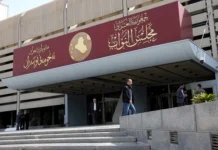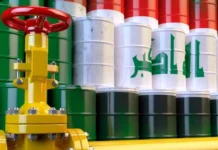Ali Al-Zubaidi is a researcher in political and media affairs. The Iraqi economy is currently experiencing a new shock as the dollar exchange rate in local markets has significantly risen. The parallel exchange rate has reached 1,540 dinars to the dollar, while the official exchange rate is only 1,320 dinars.
The recent rise in the exchange rate can be attributed to the sanctions imposed by the US Treasury Department on 14 banks. The Wall Street Journal reported about these sanctions a few weeks ago. It is noteworthy that earlier, four Iraqi banks were also subjected to similar sanctions after they were found guilty of money laundering.
According to a recent report by an American newspaper, several banks including Al-Mashshar, Al-Qartas, Al-Tif, Elaf, and Erbil, as well as the International Islamic Bank, the Trans-Iraq Bank, Mosul, Al-Rajeh, Sumer, Al-Thiqah, and Or, along with Al-Alam and Zain Iraq banks, have been banned from transferring US currency to Iran. The ban is part of a larger campaign aimed at preventing the transfer of US currency to Iran.
The recent US sanctions have caused a fresh wave of concern among Iraqis. This comes after several unsuccessful attempts by the government, during the tenure of Prime Minister Muhammad Shia al-Sudani, to bridge the gap between the parallel exchange rate and the official rate. The economic crises and setbacks faced by the American economy over the past few years have only added to the worries of the Iraqis.
It is important to note that the global economy is diversifying with the emergence of new currencies, including the Brexit currency, the euro, the Chinese yuan, and the Russian ruble. The introduction of the Brexit currency is anticipated in the financial markets next year once the legal procedures are completed. Recently, a meeting was held in South Africa where the number of members increased to over 24. These members include promising economies such as China, Russia, India, South Africa, Iran, Saudi Arabia, the Emirates, as well as some countries in the Americas like Brazil and Venezuela. It is expected that the number of members will continue to rise.
According to several researchers in economic affairs, there is a possibility that the Iraqi government will take measures to prevent banks from falling into the trap of the US Treasury’s sanctions, particularly those imposed on some banks from time to time.
It is important to note that Iraq has over 100 billion dollars in reserves in the United States. This highlights the need for the government to enhance its sovereignty over the 70+ private banks in the country.
The measures taken by the government may prevent America from imposing any further sanctions. Previously, America had imposed sanctions on 14 banks which caused a shortage of US dollars in the local market. The financial liquidity in the local market is still being managed in ways that are outdated and not modern.
It is important for the Central Bank to impose binding conditions on the development of banking in order to avoid any imposition of American guardianship through accusations of money laundering.




